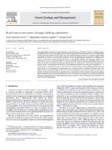Use este identificador para citar ou linkar para este item:
http://www.alice.cnptia.embrapa.br/alice/handle/doc/902187Registro completo de metadados
| Campo DC | Valor | Idioma |
|---|---|---|
| dc.contributor.author | PAIVA, P. M. | pt_BR |
| dc.contributor.author | GUEDES, M. C. | pt_BR |
| dc.contributor.author | FUNI, C. | pt_BR |
| dc.date.accessioned | 2011-10-04T11:11:11Z | pt_BR |
| dc.date.accessioned | 2011-10-04T11:11:11Z | pt_BR |
| dc.date.available | 2011-10-04T11:11:11Z | pt_BR |
| dc.date.available | 2011-10-04T11:11:11Z | pt_BR |
| dc.date.created | 2011-10-04 | pt_BR |
| dc.date.issued | 2011 | pt_BR |
| dc.identifier.citation | Forest Ecology and Management, v. 261, n. 3, p. 508-541, Feb. 2011. | pt_BR |
| dc.identifier.uri | http://www.alice.cnptia.embrapa.br/alice/handle/doc/902187 | pt_BR |
| dc.description | The regeneration of Brazil nut trees depends on tree-fall gaps in the forest. However, shifting cultivation fallows also create comparable biotic and abiotic opportunities for the dispersion and establishment of this gap-loving species. At the same time, the ability of Brazil nut trees to resprout enables fallow individuals to survive successive slash-and-burn cycles. Recognizing the importance of shifting cultivation for the food security of forest dwellers, we investigated whether the high level of Brazil nut regeneration found in cultivation fallows could be explained by the resprouting capability of Brazil nut trees, the number of cultivation cycles, past agricultural use and distance to the nearest conspecific productive adults. We found that the Brazil nut tree population density increased from 8.86 trees ha?1 to 13.69 trees ha?1 and 27.09 trees ha?1 at sites after one, two and three or more shifting cultivation cycles, respectively. As a consequence of resprouting, after a certain number of shifting cultivation cycles, the fallows become dominated by Brazil nut trees, and the landholders may decide to preserve them and to exclude enriched sites from future agricultural use. Protected for their extractive value, the secondary forests spontaneously enriched with Brazil nut trees are allowed to develop into nut-producing forests that have reduced chances of conversion into crops or pastures, thus reversing the classical process of Amazon forest degradation. | pt_BR |
| dc.language.iso | eng | eng |
| dc.rights | openAccess | eng |
| dc.subject | Cultivo | pt_BR |
| dc.title | Brazil nut conservation through shifting cultivation. | pt_BR |
| dc.type | Artigo de periódico | pt_BR |
| dc.date.updated | 2017-05-29T11:11:11Z | pt_BR |
| dc.subject.thesagro | Castanha | pt_BR |
| riaa.ainfo.id | 902187 | pt_BR |
| riaa.ainfo.lastupdate | 2017-05-29 | pt_BR |
| dc.contributor.institution | PAULO MARCELO VERAS DE PAIVA, CPAF-AP; MARCELINO CARNEIRO GUEDES, CPAF-AP; Claudia Funi, Programa de Pós-Graduação em Biodiversidade Tropical, Universidade Federal do Amapá. | pt_BR |
| Aparece nas coleções: | Artigo em periódico indexado (CPAF-AP)  | |
Arquivos associados a este item:
| Arquivo | Descrição | Tamanho | Formato | |
|---|---|---|---|---|
| AP2011Brazilnut.pdf | 281,51 kB | Adobe PDF |  Visualizar/Abrir |









